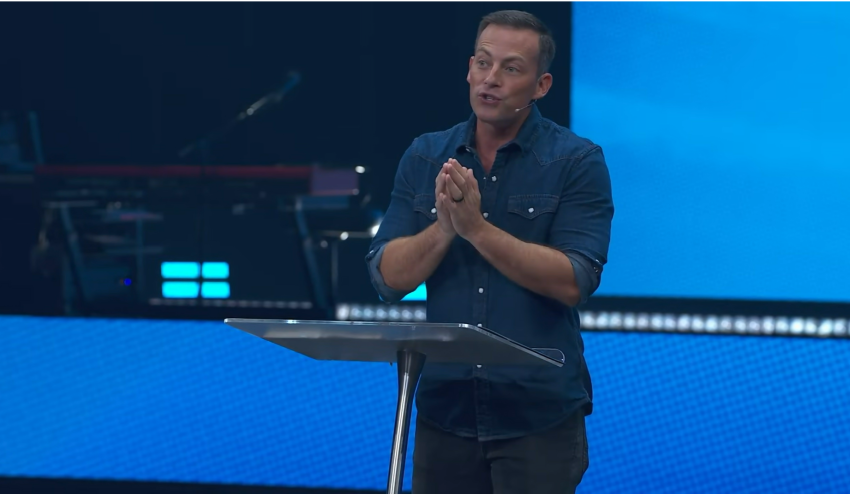Christians who don’t vote are rebelling against God, says megachurch Pastor Josh Howerton

As new research shows as many as 104 million people of faith, including 32 million self-identified Christians who regularly attend church, are unlikely to vote in the presidential election, Josh Howerton, senior pastor of the multi-site Lakepointe Church in Texas, has warned that Christians who choose not to vote will be in “passive rebellion” against God.
In a message to his congregation on Oct. 6 titled “How to Vote Like Jesus,” Howerton lamented that Christians have become passive in their political participation over the last 45 years due to a misguided idea that “churches and pastors should avoid politics and stay away from commenting on politics or political leaders.”
“I just need you to know that concept is completely and utterly unbiblical,” he told his congregation.
“You cannot read the Bible about Moses, Daniel, Esther, Nathan, Nehemiah, John the Baptist, and think that the church and pastors should avoid addressing government and governmental leaders. You just can't do it,” he said. “It's all throughout the Bible.”
He then warned that if Christians allow themselves to be silenced when it comes to the governance of the country, it is Godless voices that will prevail.
“We often say at Lakepointe, 'if the church won't disciple people, the world will,'” Howerton said. “If godly leaders, godly pastors and godly voices all go silent or refuse to be clear on issues related to politics and government, then the only voices that are left are the godless ones.”
Howerton contended that while some people might be concerned that the Church in America is getting too political, the truth is that it's the government that has overstepped its boundaries and getting more involved in theology.
“What's happening right now is, the Church is not getting more political, politics are getting more theological, and politics are getting more spiritual. When the government moved past things like building roads, issuing driver's licenses, and teaching math, to things like redefining marriage, erasing gender, reframing abortion as reproductive rights and then using the government school system to indoctrinate everybody's kids into believing those things, … the Church didn't move, politics did,” Howerton insisted.
And because the government is now engaged in spiritual and theological warfare, Howerton believes that it's the job of Bible-believing churches to arm themselves with Scripture and the Holy Spirit and fight back.
He cited Scripture as he explained that because God established the concept of the family, the Church, and the state, Christians are expected to defend these institutions by ensuring that they are being led by godly people.
Howerton also reminded congregants that America is not a democracy but a constitutional republic where politicians are representatives of the people.
The late author and philosopher Ayn Rand discussed the difference between a democracy and a republic.
A democracy, she explained, refers to a country governed by unlimited majority rule. The majority in a democracy has the right to vote on anything and to pass any laws they see fit.
“The sole standard of legality being a majority vote,” she said.
Democracy, Rand noted, is incompatible “with a Constitution because the principle there is that the sole standard of right or wrong in politics is a counting of noses.”
A republic, on the other hand, is defined as “a system of government which is limited by the individual rights of men. This means that the majority may vote, but only in a strictly limited and defined political sphere, and that the individual rights of men are not subject to majority vote, nor to government legislation.”
Rand noted that in a republic, “all that the government can and should do in regard to rights is protect them. But government cannot infringe them.”
Christians who have a solid understanding of what their faith and citizenship requires of them would not abandon their responsibility to vote, says Howerton.
“I'm going to say something that has a bit of an edge to it, but I need you to understand this biblically,” he added.
“When Christians do not vote, what they're doing is they are abdicating their leadership position in the constitutional republic that God has placed you in. And it's a form of passive rebellion against God in the exact same way that it would be wrong for a husband to refuse to lead his family, and it would be wrong for a pastor to refuse to lead his church,” he contended.
“It would be wrong for you to refuse to take part in the leadership of the nation that God has put you in,” he said. “If we go back to ask the original question, 'Would Jesus vote?' Yes. Yes, He would, because He wouldn't abdicate the responsibility that God has given Him.”
Contact: leonardo.blair@christianpost.com Follow Leonardo Blair on Twitter: @leoblair Follow Leonardo Blair on Facebook: LeoBlairChristianPost



























